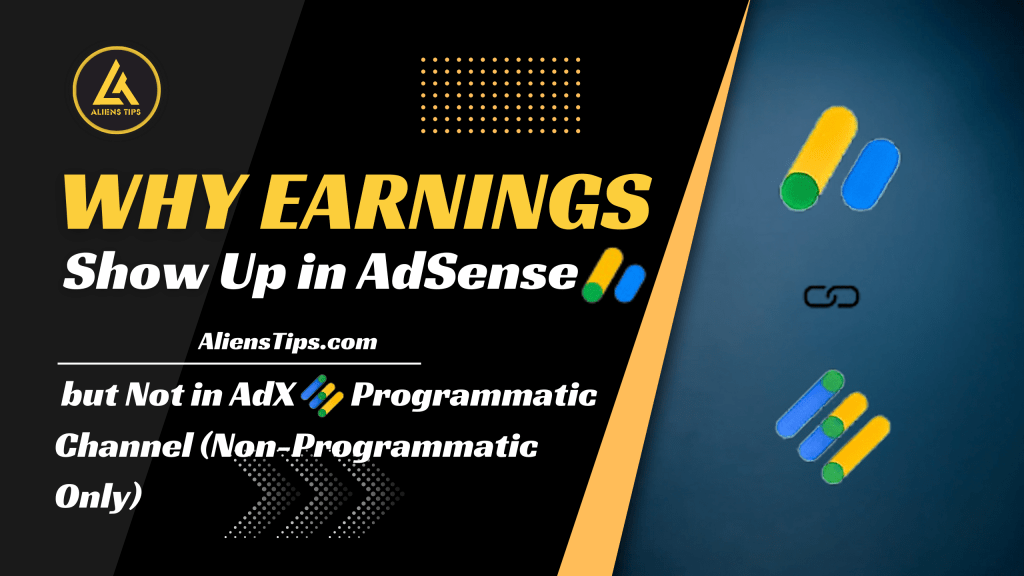Table of Contents
Why Earnings Show Up in AdSense but Not in AdX Programmatic Channel (Non-Programmatic Only)
If you’re running both Google AdSense and Google Ad Exchange (AdX) and seeing earnings in AdSense but not in your AdX programmatic channel, you’re not alone. Many publishers encounter this issue when AdSense earnings are visible, but AdX earnings don’t show up as expected. In this blog post, we’ll dive deep into the issue and provide you with a clear understanding of what might be going wrong and how you can fix it.
Problem: Earnings Appear in AdSense but Not in AdX Programmatic Channel

You’ve integrated AdSense with AdX, but while you’re seeing earnings on AdSense, your programmatic AdX channel is not reflecting any revenue. Additionally, your earnings are showing up under the Non-Programmatic channel in AdX but not under the Programmatic channel. Let’s break down why this could be happening and what steps you can take to resolve it.
Root Cause: Why Does This Happen?
- Programmatic Ads via Line Items
One common cause for this issue is the way your ads are set up in Google AdX. Since your account is not linked as a Google Ad Manager 360 (GAM 360) account, you might be serving AdSense ads through line items instead of directly linking the AdSense account. This can cause revenue to be tracked in the non-programmatic channel but not show up in the programmatic channel, which typically tracks ads served through automated auctions or programmatic direct deals. - AdSense Serving via Line Items
When you create line items in Google Ad Manager (GAM), you can specify which network or inventory source will serve the ads. If you’re serving AdSense ads via line items and not through a fully integrated Ad Exchange setup (i.e., with AdSense linked via programmatic channels), the system may consider these non-programmatic ads, which would reflect under Non-Programmatic earnings in AdX. - Non-Programmatic vs. Programmatic Channel
Google AdX separates its earnings into programmatic and non-programmatic channels. Programmatic earnings come from real-time bidding (RTB) or automated ad exchanges, while non-programmatic earnings come from more manual setups or direct deals. If you’re running AdSense ads through line items and not fully integrating the programmatic setup, the system might classify these as non-programmatic.
Solutions: How to Fix This Issue
1. Set Up Proper Integration with Ad Manager 360 (GAM 360)
If you are not using a Google Ad Manager 360 (GAM 360) account, you are likely missing out on the full programmatic integration between AdSense and AdX. Here’s what you can do:
- Consider upgrading to GAM 360: If your account qualifies and you’re eligible for GAM 360, upgrading will allow for deeper integration and a streamlined reporting system between AdSense and AdX. This ensures your programmatic earnings are tracked correctly.
- Check AdSense Account Linking: Make sure your AdSense account is correctly linked to your Ad Manager setup, even if you’re not using GAM 360. The integration should allow AdX to serve AdSense ads programmatically if everything is set up properly.
2. Use Programmatic Line Items for AdSense Ads
If you want to ensure your AdSense ads are counted in the programmatic channel of AdX, consider adjusting your line item settings. Here’s how you can optimize:
- Create Programmatic Line Items: When creating line items in Google Ad Manager (even without GAM 360), set them up as programmatic or RTB-enabled to allow automated auction-based revenue tracking.
- Optimize Ad Units and Targeting: Ensure your targeting is set correctly for programmatic demand, including adjusting the ad unit and creative settings to reflect programmatic bidding preferences.
3. Enable Real-Time Bidding (RTB) for AdSense Ads
For a more seamless programmatic integration, make sure you’re allowing RTB for AdSense ads. This will allow AdX to treat AdSense as a programmatic inventory source.
- Enable RTB Integration: Check if your AdX inventory settings allow for real-time bidding. By enabling RTB, AdSense will be treated as part of the programmatic ecosystem, and your earnings will show up under the programmatic channel.
4. Review Non-Programmatic Settings
If you are seeing AdSense earnings in the non-programmatic channel but still want to track them in the programmatic channel, you may need to review your ad unit configuration.
- Ensure Non-Programmatic Ads Aren’t Dominating: If you’re only seeing earnings in the non-programmatic channel, check whether these are manual placements or direct deals. These ads will not show up in the programmatic channel, even though they come from AdSense.
5. Double-Check Reporting Filters and Time Zones
Sometimes discrepancies can arise from filters or reporting delays. Make sure you are comparing the correct time frame and that the filters in your Ad Manager account aren’t skewing the results.
- Compare the Correct Date Range: Ensure you’re using the same reporting period when comparing earnings across channels. AdX can sometimes have delays or a different cutoff time than AdSense.
6. Contact Google Support
If none of the above solutions seem to resolve the issue, your next step should be to reach out to Google Support for help. They can check if there are any account-specific issues, policy violations, or technical glitches that may be affecting your earnings reporting.
Conclusion: Navigating the AdSense and AdX Integration
The issue of AdSense earnings showing in the non-programmatic channel but not in the programmatic channel in AdX is typically caused by how the ads are served (e.g., via line items instead of a fully integrated programmatic setup). By following the above solutions, you can ensure your AdSense ads are tracked correctly within the programmatic channel, leading to more accurate revenue reporting and better overall performance.
Make sure to review your account setup, consider upgrading to Google Ad Manager 360 if possible, and configure your line items to align with programmatic standards. This will help ensure your earnings are reported properly in both AdSense and AdX, and help you make the most out of both platforms.